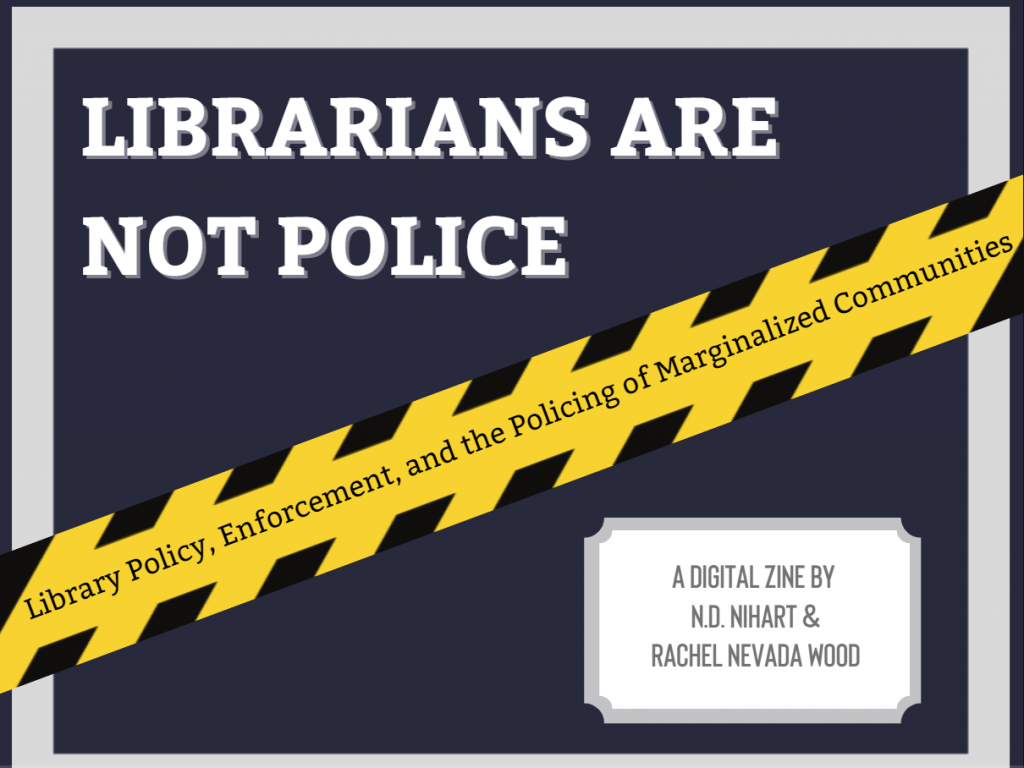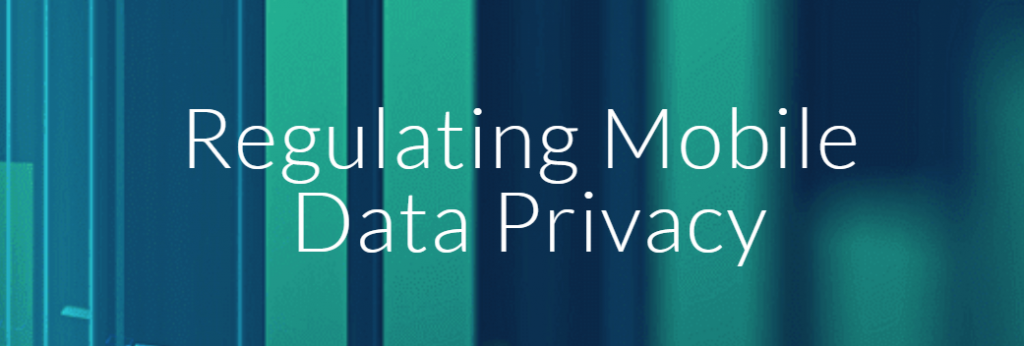Librarians are Not Police: Library Policy, Enforcement, and the Policing of Marginalized Communities
Nate Nihart & Rachel Wood
Following the protests over the deaths of Brianna Taylor and George Floyd in Summer 2020, many institutions have begun to reconsider their relationship with the police. This project explores library relationships with the police and the ways in which library policies have been used to police marginalized communities in library spaces. We describe library policing in terms of its origins, historical and current connections to white supremacy, and various impacts on marginalized patrons. We offer resources for reconsidering common library policies and common responses to policy violations. Ultimately, this project explores the question, “How can libraries address harm that occurs in library spaces while continuing to center and protect the communities we serve?”
Presenters
Rachel Nevada Wood is in her final semester here at SILS. She’s interested in working in a public library to build community-oriented participatory programming including Data Defense seminars, spotlights on local artists and musicians, and other workshops to help address community needs. Her senior thesis is titled “Exploring an Abolitionist Framework for Safety in Public Libraries.”
The Misrepresentation of Marginalized Communities in Public Health Research: A Case Study in Three Parts
Sally Smith, Jonathan Gonzalez, Adrienne McNair
The COVID-19 Pandemic has underscored the importance of reliable health data when informing public health policies and interventions. However, marginalized communities are often overlooked in the data collection and health research process. This project explores three case studies in which public health researchers created data, used tools, and applied research methods that failed to address community needs. In particular, we focus on the misclassification of racial data in Native American health research; consent, big data, and the opioid epidemic; and the delegitimization of LGBT perspectives and research in public health (including questions about federal funding). We present recommendations from these communities on how best to reflect their needs and values in health research.
Presenters
Jonathan Gonzalez is a current MSIS student at the UNC School of Information Science. He is currently a graduate assistant at the Adams School of Dentistry Office of Institutional Effectiveness where he works with students and staff to utilize practices to improve operations and student wellness. His previous position was as a research analyst at Innovate Carolina where he created documents analyzing the RTP business landscape to connect large businesses with UNC entrepreneurs. His interests include business and information analysis, data and information organization and utilization, and environmental sustainability.
Regulating Mobile Data Privacy
Kara Wong, Thomas Williams, & Felicity Walston
Current federal data privacy laws allow companies and data brokers to sell user data to anyone, including the US government. This project explores how federal agencies and law enforcement can take advantage of loose data privacy regulations and the ways companies respond. We describe the current legal landscape for data privacy in the US and specifically focus on the connections between data brokers and local, state, and federal agencies. This project examines specific cases of government agencies using data brokers to circumvent legal requirement for obtaining personal data.
Presenters
COVID-19 Research, Open-Access Publishing, and Inequity in the World of Academic Publishing
Anna Twiddy & Katherine Ledson
One of the most consistent responses to issues of inequity in the publication of academic research has been the advocacy of open-access publishing. In the age of COVID-19, as research on the pandemic has been published largely without the traditional paywalls and other restrictions that typically accompany the publication of academic research, many commentators have increasingly touted open-access publication as the major solution to these issues, citing, among other factors, the importance of keeping the public informed about this new disease. This project takes a critical look at the assertion that COVID-19 research publication presents an uncomplicated case for increased open-access publication more broadly. We will first present on the ways in which the publication of this research does effectively lay bare the inequities of the traditional modes of academic publishing, and the noteworthy benefits of open-access publishing in the time of crisis specifically. Then, we will introduce some important, yet often overlooked, complications of power endemic to open-access publishing, including issues of labor compensation, the potential for misinformation in the popular media, and the overarching question of an academic journal’s potentially conflicting ethical duties to its authors as well as its readership.
Presenters
Anna Twiddy (she/her/hers) is a first-year MSLS student at SILS, specializing in academic libraries. She is presenting with Katherine Ledson on the relationship between COVID-19 research, the open-access model of research publication, and larger issues of inequity in the world of academic publishing. Her other research interests include disability in the academic library and English literature subject librarianship.
Surveilling for Success? An Examination of Data Collection and Use for Academic Success and Well-being
Claire Macomson & Alexandra Paz
School systems across the country have more options to track student data than ever before. While standardized test data has long been used to predict outcomes for both students and school systems, the COVID-19 pandemic has given schools unprecedented access to new types of student and family data, including health, location, and biometric data. This project explores the benefits and detriments of new and established methods for educational surveillance and collection of health data. We describe the complications of using student data to predict and provide support for individual students’ learning objectives. Additionally, we focus on how the accumulation of big data involving students can further strengthen schools’ institutional power over students by enforcing racial, socioeconomic, gender, and other types of discrimination. We ask, “What will become of all the data school are collecting during COVID-19? What will it be used for? What risks and dangers might we be overlooking? Are they worth the immediate benefits?”




